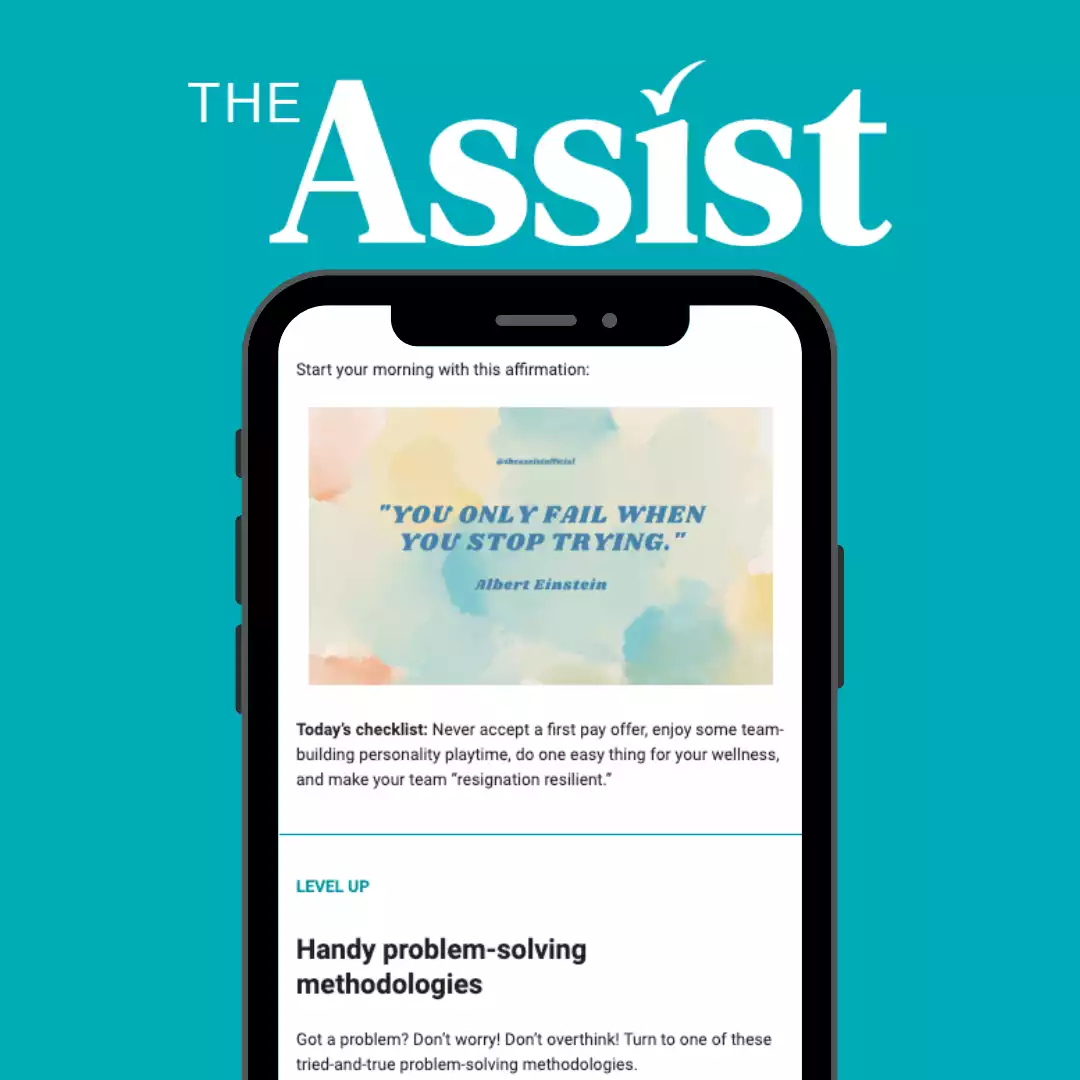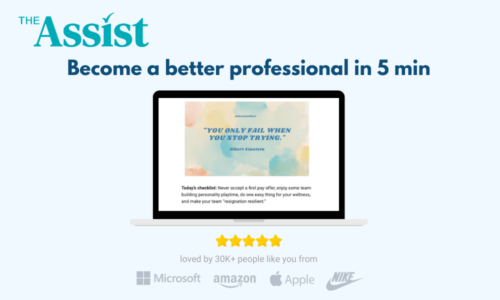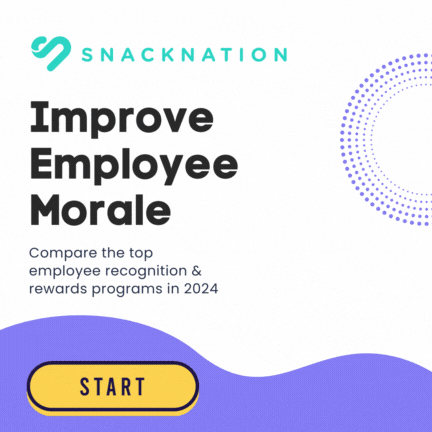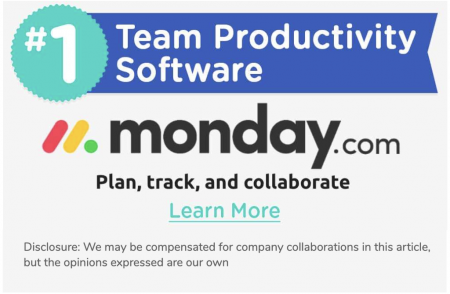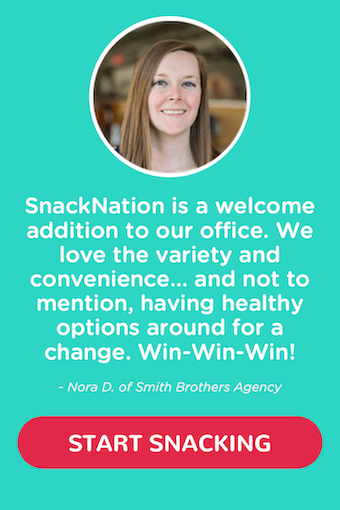So, tell me about yourself.
The question that is inevitably asked in every job interview or networking event.
The Assist is a free, enjoyable weekly email offering actionable tips for leveling up in your career and growing your professional portfolio. It's like that reliable friend you turn to for work and life advice, sending advice 4x a week to hardworking, go-getters like yourself.
❤️ Why we love this community:
- Discover valuable resources to grow your communication skills.
- Enhance professional growth through actionable advice.
- Be a part of a supportive community to network and grow as leaders.
When you attend a professional event, the conversation eventually makes its way to the subject of yourself.
Our top tip: Put your best foot forward and convey yourself successfully and wholeheartedly.
👉 Continue reading to find more advice on how to talk about yourself professionally.
Page Contents (Click To Jump)
The Importance of Knowing How to Talk About Yourself Professionally
“Tell me about yourself” is an open-ended question that can go in many directions, yet it is one of the strongest ways you can connect with industry professionals.
Knowing how to talk about yourself professionally is crucial because it helps you effectively communicate your skills and experiences to potential employers or colleagues, making it easier to secure job opportunities and build strong professional relationships.
Additionally, a professional self-presentation instills confidence in others about your capabilities and credibility, enhancing your reputation in the workplace.
The ability to articulate your achievements and goals professionally allows you to set clear career objectives and work towards continuous self-improvement.
Your professional life has a story to tell. And, inevitably, you’ll be asked to share it. Tell it in a confident way that leaves positive first impressions that build on your career. First impressions may lead to new job interviews, and second impressions may bring about job offers.
🛑 Pro-Tip from The Assist: When answering the question “Tell me about yourself,” focus on providing a concise and relevant overview of your professional background, highlighting key accomplishments and skills that align with the job you’re interviewing for. Keep your response concise, typically lasting no longer than two minutes, to maintain the interviewer’s interest and allow for further exploration of your qualifications.
Understanding the Context
Talking about yourself is a soft skill that has a few key aspects that need to be considered. The most significant one is the context.
The context where you respond to the common question, “Tell me about yourself,” affects how you should answer. Your answer depends on who, and for what reason, a professional is asking; they may be a hiring manager, a colleague, an industry connection, or a recruiter.
💼 Job Interviews
Contextually, you are likely to be seated at a table across from an interviewer for a job interview. It is a formal discussion, yet it also carries an air of excitement because this is a job that you have wanted for a while. Fortunately, the common interview question, “Tell me about yourself,” can show the employer that you match well with the company. Select from your experiences ones that align with the company’s culture and goals.
A great job interview tip to prepare for this job interview question is to go on the company’s website and conduct research into their culture and goals. Since job interviews are two-way streets, prepare interview questions to ask the company about company culture and goals.
🤝 Networking Events
Networking events are a business casual gathering of fellow industry professionals, who attend as a way of forming connections and drumming up potential business. This is not a formal interview, but rather a conversation that always begins with the question, “What do you do?” For example, during a two-hour luncheon event with hundreds of attendees, you will answer that question the same way many times. Come prepared with responses that give a great first impression. Collect contact information from everyone and send follow-up emails to anyone whom you want to connect with further.
🗣️ Social Situations
There is a bevy of social situations where you can be asked about your professional experience. Be prepared to give highlights of your current and past experience to others at career fairs for job seekers, team meetings with team members, or anywhere else. Social situations can take place in various settings, including in-person interactions and on social media platforms, such as LinkedIn. Some situations start with an icebreaker, but some have no standard format. A good rule of thumb is to ask questions related to present experience, and then move in the direction of either past work experience or towards career path goals.
Whoever you speak with, structure your response that covers the key points you wish to convey.
Structuring Your Answer to “Tell Me About Yourself”
👇 Present
Your current role is the ideal place to start answering this question. Give a brief job description in two or three points from the last year. Elaborate by explaining your line of work, what is interesting about the job, and important partners. To answer, you can add to your responses with a few techniques.
- ⭐ Highlight Achievements: Has your company reached goals and made accomplishments? Share specific achievements, such as projects you are currently working on, and goals you are in the middle of accomplishing.
- ⭐ Connect to Your Goals: Emphasize your use of valuable skills in your current job are relevant to your career goals, and how what you’re doing now is a stepping stone toward your desired future.
- ⭐ Passion and Growth: Express enthusiasm for your current profession, and what you are doing to thrive in it (like enrolling in professional development courses). Sharing your passion makes a lasting positive impression on others.
👈 Past
You have many moments in your life story to bring up work history that may reach back to high school. Out of all of your years of experience, determine for yourself which ones are the highlights, the learning moments, the mistakes, and the unexpected. Recall the colleagues whom you especially liked working with. Recall any unique experiences and turn them into lively stories that fully recognize the great moments that they were.
- ⭐ Highlight Relevant Skills and Experiences: When someone asks how your past experience has helped you in your current role. Explain how the knowledge and expertise gained in your previous role have benefitted your new endeavors.
- ⭐ Frame Challenges as Learning Opportunities: Challenges and setbacks are part of everybody’s career path. Speak to what they are, and present them as learning experiences.
- ⭐ Discuss Achievements and Contributions: Use quantifiable metrics whenever possible to show the extent of the contribution. For any achievements, speak to the conditions in which they were accomplished.
👉 Future
Know your short and long-term professional development goals. What specific jobs are you reaching for? Who do you want to partner with? Share these answers at networking events and social situations, and you may connect with other industry professionals with connections associated with your future goals.
- ⭐ Connect your current job to your future goals: Emphasize how your current job is providing you with the skills and experiences that you need for professional development, so you can continue achieving your career goals and landing dream jobs.
- ⭐ Relate to Your Current Path: Unless the job you have in no way helps your career goals, then in what ways does your current job relate to your future?
- ⭐ Highlight Your Motivation: Whether it is personal ambition, a desire to make a positive impact on others, or a pursuit of innovation, your motivation is a powerful driving force behind your actions.
Highlighting Your Professional Experience
How to talk about yourself professionally should always start with the highlights. They are the finish line, the celebration, and the reason for all the hard work. These experiences brought out incredible personal traits that you take with you. Pick and choose which accomplishments, projects, and roles best exemplify your professional self.
🛠️ Skills
The skills you honed through hard work are valuable assets that others want to know about. Some you may use every day, and others you may not have used in a while. Nevertheless, skills of all degrees can be valuable talking points.
- ⭐ Questions and Answers: After you discuss your skills, ask about current or future projects where your skills can be helpful.
- ⭐ As Part of a Team: How did you apply your skills as part of a team? And, which skills did other members of the team bring to the table?
- ⭐ Flexibility: Was there a time when you were asked to step outside your role, and you ended up gaining a skill? This eagerness to learn is a positive trait worth mentioning.
🏅 Accomplishments
The things that you bring out from a particular role are the accomplishments people ask about. These may be the impact your accomplishment had on others, or any products created or sold.
- ⭐ Quantify your achievements whenever possible: Measurable outcomes like percentage increases, revenue generated, or time saved exemplify the success of the achievement.
- ⭐ Use the STAR (Situation, Task, Action, Result) method: This structured response conveys the achievement in an orderly and effective style.
- ⭐ Relate to the Job or Company: Tailor your accomplishments to align with the job or company you’re applying to or interviewing with.
📁 Projects
Highlight any projects that demonstrated abilities related to your audience. You can demonstrate your knowledge and skill by discussing projects in detail. Furthermore, people may be asking about your projects if they want to collaborate or partner with you on similar projects.
- ⭐ Provide Evidence and Context: Where, when, and for whom did the project exist?
- ⭐ Be Specific: Go further than the main idea of the project and speak to the project’s origins and the team that worked on it. What happened along the way? How did it conclude? Details like these make the story vivid and memorable.
- ⭐ Tailor to the Audience: Whether they are hiring managers, industry professionals, or customers, your audience expects you to speak to their knowledge level. Use language that is appropriate: for example, avoid using overly technical terms with customers.
Discussing Your Personal Attributes
If your work experience and your goals are the “what you do” part of your professional life, then your personal attributes are the “how you do them” aspect of your professional career. Learn how to use positive affirmations and use these as a benchmark for your attitudes at work. Let others know the positive attributes you demonstrate, and they will know how you can work at their company.
🤪 Personality
Of all the countless personality attributes one has, there are a few that are especially important in a professional environment. Each one of these attributes can be told through concrete examples.
- ⭐ Professionalism involves maintaining a positive attitude when things get tough in order to accomplish the work. It also encompasses punctuality, hygiene, and etiquette.
- ⭐ Adaptability in changing circumstances means you have taken on new roles, learned new skills, or have found outside-the-box solutions to existing challenges.
- ⭐ Dependability means you consistently follow through on commitments and meet deadlines.
- ⭐ Communication Skills, both written and verbal, mean you can articulate ideas clearly to other members of the team.
- ⭐ Leadership involves taking initiative, guiding others, and being a positive influence on colleagues.
- ⭐ Problem-solving can identify and solve issues, either as a team or independently.
- ⭐ Time Management can prioritize tasks, manage a busy schedule, and stay organized.
🧐 Interests
All of your interests may relate to your career, or you may have some outside of work. Consider which personal details to mention to certain audiences. Talking about your interests with both employers and colleagues has a lot of benefits to your overall quality of life.
- ⭐ Showcase Well-Roundedness: Your work supports other interests, and you make time outside of work to follow passions and hobbies that contribute to your well-being and personal growth.
- ⭐ Highlight Relevant Skills and Values: In what ways do your interests help you stay on top of your work and at your best on the job? For example, you may participate in volunteer work on weekends as a way to give back to the community, when you don’t especially get that from work.
- ⭐ Soft Skills and Personal Growth: Many interests involve either teamwork, leadership, time management, or problem-solving, just to name a few. For example, being an avid hiker demonstrates that you stay physically fit and demonstrate resilience and determination. Whatever your interests, show which qualities are applied to personal goals and challenges.
🎯 Goals
Goals exist in many forms, and because of this, you can set any professional goals you want. Determine which ones can be achieved at your current employer, and where the others can be. When you consider how many goals you have, big and small, immediate and long term, you realize how many people you can involve in your plan of action.
- ⭐ Research and Company Alignment: Start by thoroughly conducting research into companies in your field to identify places where your goals can be met. When you have meetings with these companies, you can speak to how your goals align.
The Assist is a free, enjoyable weekly email offering actionable tips for leveling up in your career and growing your professional portfolio. It's like that reliable friend you turn to for work and life advice, sending advice 4x a week to hardworking, go-getters like yourself.
❤️ Why we love this community:
- Discover valuable resources to grow your communication skills.
- Enhance professional growth through actionable advice.
- Be a part of a supportive community to network and grow as leaders.
Practical Tips on How to Talk About Yourself Professionally
1. Pay Attention to Body Language 👥
Body language plays a major role alongside verbal communication. As you hold conversations, pick up on indicators that show interest, impatience, boredom, and agreement. Doing so allows you to begin a conversation with a complete stranger and, based on their body language, you can modify your speech to hold their interest. After all, everybody has different interests and attention spans.
2. Recognize the Tone of Voice 🤩
Voice comprises pitch, volume, and speed and relates to public speaking. As you prepare to speak about yourself professionally, recognize your tone of voice gets the message across correctly. Your audience will thank you for matching your tone with the message. With practice, you can use tone to bring enthusiasm to accomplishments, convey confidence in the future, and garnish laughter from a retelling of a fantastic office event.
3. Use of Specific Language👌
The same speech must be rewritten based on the audience. There are usually two versions: one for people in the industry, and another for everyone outside. Talking with fellow industry members lets you speak with technical jargon that needs to be used to convey plans and goals. But talk to a professional in another industry than your own, and that jargon sounds confusing. Furthermore, convey yourself professionally by using formal English and avoiding slang terms.
4. Use the STAR Method ⭐
Use the STAR method to format your responses to anything you want to talk about your professional career. The structure introduces the event and follows it through to its result. The acronym stands for Situation, Task, Action, and Result.
- Situation: Describe the situation or context in which the event occurred.
✅ Example Answer: Several years ago, I was working as a project manager and one of our high-profile clients gave us a critical project. We had to make major modifications to our existing software offering to accommodate their request.
- Task: Outline the specific task or challenge you faced.
✅ Example Answer: As project manager of a team that included developers and technical writers, I orchestrated the design process that led us from having a blank slate to taking progressive action.
- Action: Explain the actions you took to address the situation, emphasizing your role and contributions.
✅ Example Answer: I got a hold of the schedules of each team member and, around their schedules, held weekly team meetings, where we presented updates and ideas. As we created the features of our software, I provided updates and timetables to the client.
- Results: Conclude by detailing the positive results or outcomes of your actions
✅ Example Answer: Each feature met or exceeded functionality and expectations. Because the client was informed of the progress, at no point were they pushy. Since the team met often, we never went too far off track, which allowed us to make corrections early and often.
With this template, you can present experiences seamlessly from ABC to XYZ. The well-organized and impactful manner makes it easy for others to comprehend your skills and attributes.
5. Practice Active Listening 👂
You have said your part with clarity and tone of voice, and now it is your turn to listen. Practice active listening and the conversation will go smoothly. Engage your listening skills by facing your audience, making good eye contact, agreeing at their natural pause breaks, and nodding occasionally to use body language that shows you are listening.
The most common reason why you aren’t actively listening is because you are internally thinking about what to say next. Prepare each aspect of your communication so that you are fully ready to engage in meaningful conversations with any kind of industry professional.
Aside from these tips about talking about yourself professionally, you should check out The Assist, a free 4x weekly newsletter featuring personal and professional development tips to level up.
People Also Ask These Questions About How To Talk About Yourself Professionally
Q: What are some effective ways to introduce yourself professionally?
- A: Start by stating your name and your job title and, they will usually interject by saying “Nice to meet you”. This cue invites you to offer them a brief summary of your most current work experience. If you are a recent graduate just beginning a job search without previous experience, speak to your most memorable classes and experiences as a student.
Q: How can you highlight your skills and experiences when talking about yourself?
- A: Talk about the skills and experiences you would put on a resume and go into further detail by talking about any challenges and outcomes.
Q: What are some common mistakes to avoid when talking about yourself in a professional setting?
- A: You should avoid the common mistake of exaggerating accomplishments as a way to make yourself seem more qualified at a new job. Another mistake is interrupting the other speaker. A third mistake is rambling on one-sidedly without allowing the other person to respond.
Q: How can you tailor your self-introduction to a specific job or industry?
- A: Tailor your self-introduction to a specific job or industry by doing research into the company’s goals and jobs. If you are introducing yourself to a profession in a specific industry, learn about that industry and align your own goals and skills to it.
Q: How can you present yourself confidently and authentically while still maintaining professionalism?
- A: Present yourself confidently while having a conversational tone, and keep the conversation on topic about professional skills, industry trends, and career paths.


